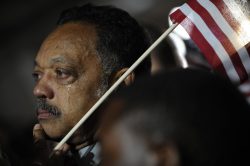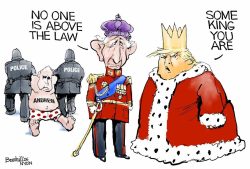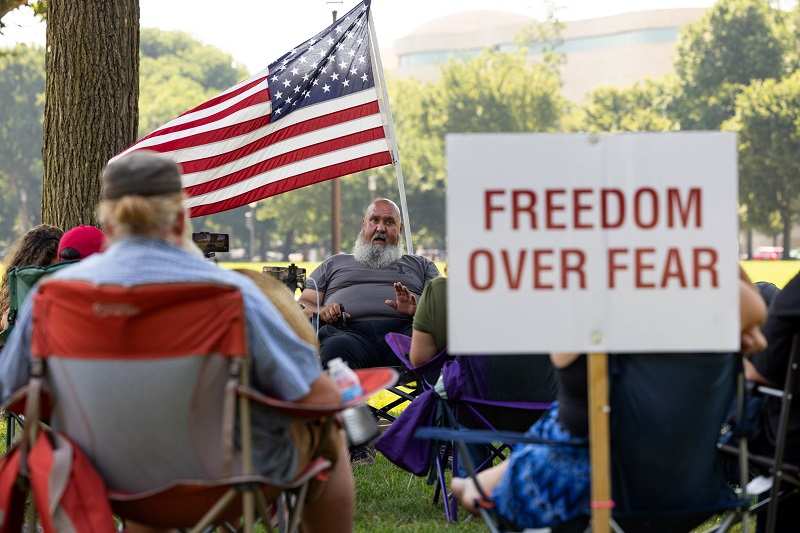
David “Santa” Riddell, the leader of the 1776 Restoration Movement, leads a morning meeting at the group’s site along the National Mall in Washington, D.C., on Aug. 4.
16:24 JST, August 8, 2022
WASHINGTON – For the past few weeks, Rose Koepsell has awakened to one of the best views in D.C.
“It’s surreal,” said Koepsell. “We get up in the morning, and there is the Nation’s Capitol, sir, staring us straight in the face. And then you look to the west, and it’s the Washington Monument. How cool.”
Koepsell, 57, from a small town near Lake Tahoe, Calif., isn’t staying in a pricey hotel room. She’s been living in her Dodge Grand Caravan along the National Mall by the National Gallery of Art.
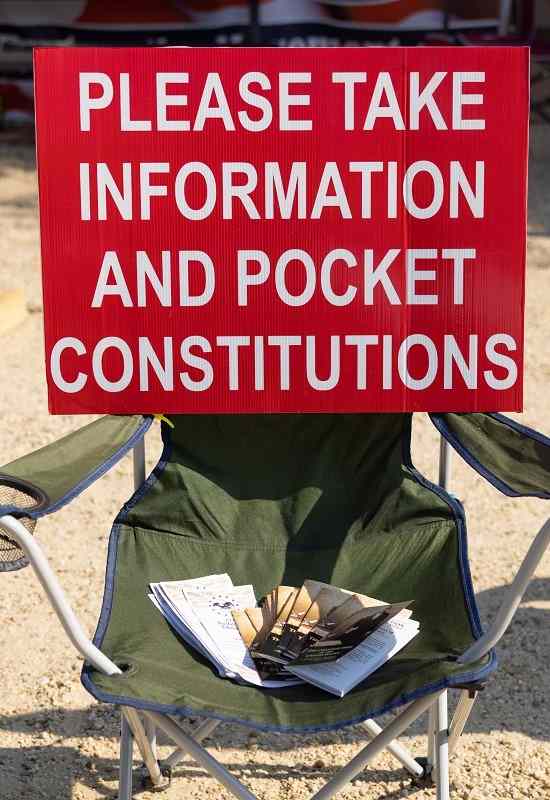
Literature from 1776 Restoration Movement is available Aug. 4.
That’s where she and other members of the newly formed 1776 Restoration Movement – which broke off from the People’s Convoy demonstrations against coronavirus mandates earlier this year – have parked their protest.
They were hoping that thousands or maybe even millions of other Americans would join their cause, Tom Fisher, 70, a retired state park ranger from Arizona said as he stood in the shade on a blistering hot Washington afternoon last week.
Instead, there are about two dozen stalwarts who’ve camped out with American flag-draped cars and trucks since July 6 to demonstrate against what they say is America’s slow but sure abandonment of the Constitution and to call for a peaceful return “to a constitutional Republic through the restoration of a moral society.”
“I’m disappointed,” Fisher said. “I thought once we occupied D.C., people would come out.”
People didn’t. The response, instead, has been mostly indifference. As well as some heckling and trolling. And some criticism that 1776 Restoration Movement is just another group using a narrowly defined patriotism to grift for dollars and social media clout.
The protesters deny all of that. They say their cause is pure. For the past few weeks in Washington, their morning ritual has been the same. The first-risers get coffee going. Someone puts out doughnuts and fruit and snacks. Ice-filled coolers are restocked with water bottles.
At 8 a.m. the members gather in a circle under the Mall’s majestic trees. They sit for a short prayer, stand for the Pledge of Allegiance and sit back down for a meeting. It ends with a rally cry.
“1, 2, 3, FREEDOM!”
On most days the meeting is followed by a march around the U.S. Capitol with signs and flags. They have been greeted with a mixture of thumbs ups and “freedom fingers,” as the group has taken to calling the universally recognized middle finger salute delivered by people who they say tell them to “get a job” or “go home.”
They have copies of the Constitution to hand out to anyone interested and pamphlets stating their beliefs: “We are a constitutional Republic We are not a Democracy. Governments are Established Not to Make us Equal, but to Protect our Liberties. Federal Agencies should be State Managed.”
The demands are both grand and vague. When asked for specifics, the members will say that they want representatives to recognize that they work for the people and address their grievances.
What the protest boils down to for most is a belief that the federal government should have much less authority over state governments when it comes to deciding almost every issue.
Support for that position here has been hard to garner. Most visitors have ignored them. The majority of the people who have stopped to talk with them have been foreigners, Fisher said. “They want to know what we’re about,” he said.
Protests, of course, are as common as joggers on the National Mall. Getting passersby to pay attention can be a challenge. On a recent weekday, a small group of young tourists stopped a short distance from the protesters taking photos with their phones and inching closer for better shots. But the object of their attention wasn’t the people or the flags or the signs. It was an albino squirrel that sat nearby munching on a piece of bread.
Still, most of the protesters say they are not discouraged and that the experience has been worth it. They are from points near and far. Frederick, Md., and Dickinson, N.D. Tidewater, Va., and Lake Havasu City, Ariz. Daytona Beach, Fla., and Lebanon, Ohio. For many, it is the first time in their lives they have taken part in a protest. They all took different paths to get here, but the destination, both physical and philosophical, has brought them together in ways they hadn’t anticipated.
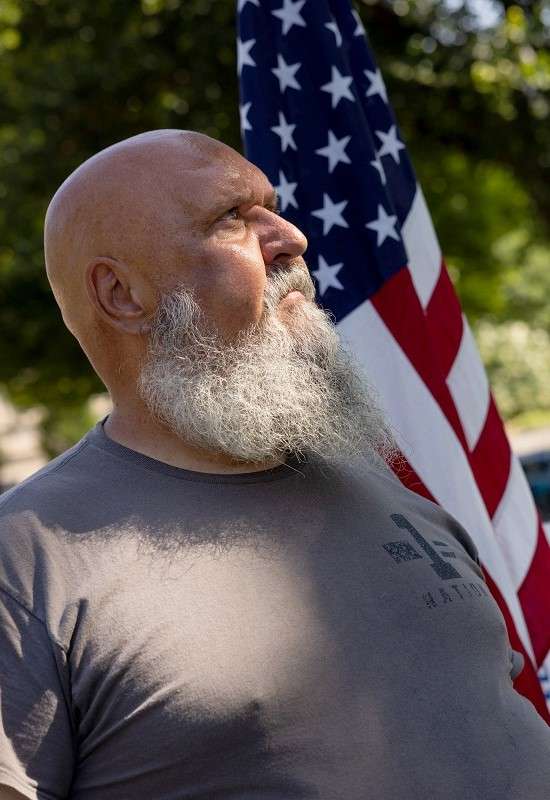
David Riddell says the 1776 Restoration Movement is an offshoot of the People’s Convoy.
“This is family,” says Ohio truck driver and evangelical minister David Riddell, 57, the group’s leader, who said he never joined a protest until he connected with the People’s Convoy earlier this year. His eyes brim with tears. “So far in this movement, I’ve baptized three of them in the Potomac, renewed the vows of another couple, celebrated the 57th wedding anniversary with another one. This is family.”
In the family, Riddell allows debate and input on the issues, but he makes the final decisions, he said. He is also a member of the Proud Boys, the far-right extremist group that has a number of its leaders facing federal charges of seditious conspiracy and “opposing the lawful transfer of presidential power by force” on Jan. 6, 2021.
Riddell says he was not at the Capitol that day and has told his followers that if they choose violence, then he will no longer take part in the protest.
“Do I agree with what went on Jan. 6? No, absolutely not. That’s not how we do things,” said Riddell, who is bald and bearded and goes by the nickname Santa. “Do we have a Second Amendment right to throw off a tyrannical government? Yes. That’s what the Constitution says. But do we have a moral right to do that at this time? The answer to that is a resounding no. You do not, because you don’t use violence until it is the absolute last resort.” Riddell is a hunter and gun owner but says he has “absolutely forbidden” members of his group from bringing guns into the District of Columbia.
Like Riddell, many in the 1776 group joined the People’s Convoy earlier this year, a caravan of trucks and cars that was organized to protest vaccine and mask mandates across the country and decry what its members said were infringements on freedom.
The participants in that protest expressed a wide range of right-wing and libertarian views. Some believed in debunked conspiracy theories and false claims about satanic child-sex-trafficking rings. There were election deniers. Covid deniers. Reality deniers. There were also those who just felt the country was falling apart and away from what they believed it should be.
Some of the convoy’s members wanted to drive into Washington, bring it to a standstill and have their grievances heard. They wanted to follow the model pursued by Canadian truckers who drove into Ottawa in February to protest vaccine mandates in the Canadian capital and also blocked border crossings.
In March and again in May, the participants in the People’s Convoy debated entering Washington and being met there by tens of thousands for a massive protest.
That didn’t happen.
Instead, the convoy circled the Beltway trying to snarl traffic and make a point. Riddell would later be arrested for his role in blocking traffic on Interstate 95, but the plans to flood the city with vehicles and protesters never panned out. Riddell said that when he learned the convoy’s leaders didn’t want to drive into the capital he split from the group and others soon followed him.
Many in the splinter group say they are anti-socialist and anti-big government and anti anything they think is anti-American. Their food and gas expenses are funded, they say, by other Americans who feel the same way they do. The group’s brochure solicits donations through Cashapp, Venmo and Zelle. Riddell estimates the group has raised approximately $73,000 since forming.
They don’t believe mainstream news and get their information from far-right websites. They also follow each other’s live streams (there are lots of live streams). In their shared distrust of government and politicians and media, they found a community of like-minded souls.
They also insist they’re nonpartisan.
“This is not a left or right issue,” said Victoria LaRocca, 35, pointing out that the group doesn’t fly any Trump flags or have signs supporting any candidates. “It’s a constitutional issue. It’s petitioning.”
Some gave up everything to join the cause.
“Many have quit their jobs, lost their businesses and are ready to lose their home to be here. Some people have cashed in their 401(k)s,” said Koepsell, who speaks softly and said she joined the group because she felt directed by the Lord to respond to disasters and crises. And “America is kind of in a disaster right now.”
“When I see America I see a lot of good,” Koepsell said. “And I see a lot of brokenness. Trillions of dollars in debt. Inflation fueled by printing money. Confusion over who America is. Who America was. … We need to stop being one side against another. We need to be Americans fighting for our country.”
If some of the group’s goals were philosophical and long-term, some of their needs were practical and immediate. When he first led his group into the District, Riddell said didn’t think he should need a permit to protest. “The Constitution is our permit,” he said defiantly. But protesters need port-a-potties. And port-a-potties need a permit. “The toilets is what broke me,” Riddell said, laughing.
For showers and to get a break from camping out in their cars, members occasionally headed to their base camp, a truck stop 83 miles away in Bunker Hill, W.Va., where their supplies of food, water, hygiene products, toilet paper and snacks are stored.
The protest on the Mall has been mostly peaceful but not without incident. The group’s permit issued by the National Park Service does not allow them to sleep in their cars.
U.S. Park Police officers observed violations and contacted the group regarding their noncompliance with rules, said Mike Litterst, spokesman for the Park Service’s National Mall and Memorial Parks. “Park Police are continuing to monitor the activity and if violations continue the group’s permit could be revoked,” he said in a statement.
There have also been ongoing hostilities with members of another offshoot of the People’s Convoy who have accused the 1776 Restoration Movement of having members who are convicted sex offenders. Riddell said there was a former member of the group who had been convicted of child molestation in Indiana but that that person has left. That hasn’t stopped the bickering, online and in person, between the two groups.
On Monday, the group’s protest permit expires. By then, the last of the 1776 Restoration Movement protesters will have packed up their signs and flags and camp chairs and coolers and retreated to Bunker Hill, where they plan to regroup, reorganize, reread the Constitution and prepare to return in early September to redress their grievances once more.
Top Articles in News Services
-

Survey Shows False Election Info Perceived as True
-

Prudential Life Expected to Face Inspection over Fraud
-

Hong Kong Ex-Publisher Jimmy Lai’s Sentence Raises International Outcry as China Defends It
-

Japan’s Nikkei Stock Average Touches 58,000 as Yen, Jgbs Rally on Election Fallout (UPDATE 1)
-

Trump Names Former Federal Reserve Governor Warsh as the Next Fed Chair, Replacing Powell
JN ACCESS RANKING
-

Japan PM Takaichi’s Cabinet Resigns en Masse
-

Japan Institute to Use Domestic Commercial Optical Lattice Clock to Set Japan Standard Time
-

Israeli Ambassador to Japan Speaks about Japan’s Role in the Reconstruction of Gaza
-

Man Infected with Measles Reportedly Dined at Restaurant in Tokyo Station
-

Man Infected with Measles May Have Come in Contact with Many People in Tokyo, Went to Store, Restaurant Around When Symptoms Emerged





